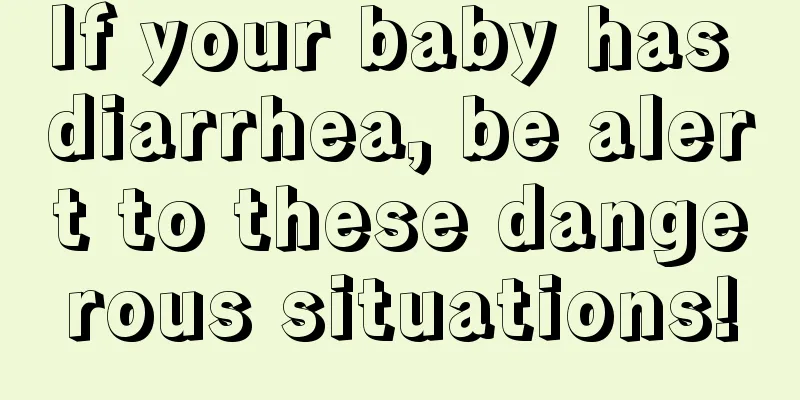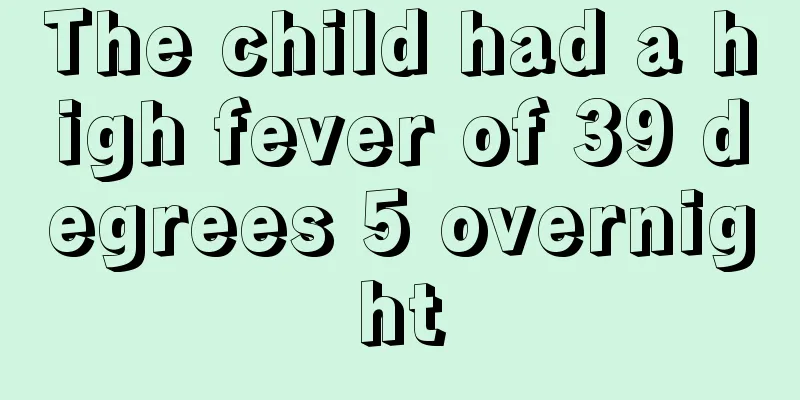If your baby has diarrhea, be alert to these dangerous situations!

|
Many babies have weak resistance and poor immunity, so they are easily invaded by viruses. Once they are sick, they will have symptoms of diarrhea. Many mothers think that the problem can be solved by giving their babies some medicine or using some folk remedies. However, if symptoms such as fever and bloody stools occur, mothers should pay attention and take correct measures in time to help their babies get rid of the illness. 1. Symptoms of diarrhea in babies: fever The main temperature response to diarrhea in infants and young children is fever, and most of them are moderate fevers (around 38.5℃). This is common in diarrhea caused by Escherichia coli, Campylobacter jejuni, Shigella, Salmonella, rotavirus, enterovirus, etc. Fever may precede or occur at the onset of diarrhea. 2. Symptoms of baby diarrhea: bloody stools Common symptoms of diarrhea in children include loose stools, watery stools, egg-drop soup-like stools, yellow-green stools, or stools containing a small amount of mucus. The child has diarrhea about 5 times a day. When a child has diarrhea, if there is blood in the stool or there is bloody or purulent stool, and the amount of stool is small each time, but the child sits in the potty and is unwilling to get up, it may be dysentery, jejunal tortuosity diarrhea, or enterohemorrhagic Escherichia coli diarrhea, and the child should seek medical attention immediately. 3. Symptoms of baby diarrhea and dehydration The baby is already seriously dehydrated, showing symptoms such as drowsiness, coma, noticeable sunken eye sockets, inability to close eyes when sleeping, no tears, abnormally dry mucous membranes in the mouth and tongue, and poor skin elasticity. At this time, he basically has no desire to drink water. We call this the early stage of shock. The condition is quite serious and he must be rushed to the hospital for emergency treatment. Dangers of diarrhea in babies: 1. Baby's diarrhea will interfere with normal gastrointestinal function; 2. Repeated or prolonged diarrhea can lead to malnutrition and reduced resistance in children; 3. Frequent and heavy diarrhea and vomiting can cause loss and imbalance of water and electrolytes in the body, and even lead to death. What to do if your baby has diarrhea: 1. Give water, rice soup, juice, rehydration salt, etc. to regulate the baby's stomach and intestines after each diarrhea; 2. Supplement adequate intake and provide easily digestible food, avoid raw, cold, and hard food; 3. Do not abuse antibiotics, because many drugs have certain irritation to the gastrointestinal tract; 4. Before the disease develops seriously, go to the hospital in time for stool testing and culture to find out the pathogen and prescribe symptomatic medication. 5. Observe the changes in the condition. If the condition does not improve, you should see a doctor again. Before seeing the doctor, prepare fresh, uncontaminated stool that has been excreted within 1 hour for testing. |
<<: How to deal with seizures in children?
>>: What to do if your baby has a fever after vaccination
Recommend
What to do if a 14-year-old boy has acne
It is normal for a fourteen-year-old boy to have ...
Why does my child have a stomachache when running?
When parents take your children running, they mus...
Why is the area around the child's anus red?
Every parent hopes that their child can grow up h...
What are the roles of allergen testing in children?
Children may suffer from various diseases as they...
How to tell if a newborn is calcium deficient?
The phenomenon of calcium deficiency in newborns ...
If your child is nauseous and vomiting, observe the symptoms and then treat them
Sometimes children will experience symptoms of na...
Is dietary therapy effective for baby’s cold? Four dietary treatments for baby colds
Because babies are in the early stages of develop...
What to do if a child has a viral fever
Many babies will feel unwell if they are not prop...
Can babies eat grapefruit? Don't eat too much!
Grapefruit is a very common fruit. Eating grapefr...
What are the symptoms of sepsis in children
Sepsis is a serious disease caused by infection o...
Key points for standard care of infant development at three months
In fact, you should be extremely careful in carin...
What causes children to have frequent headaches?
In life, many parents will enroll their children ...
One and a half month old baby's development
When the baby is growing and developing, each sta...
What to do if your child has tonsillitis and severe cough
Tonsillitis is a very common inflammation in life...
Causes of nosebleeds in children
Nosebleed is a common condition in children, espe...









